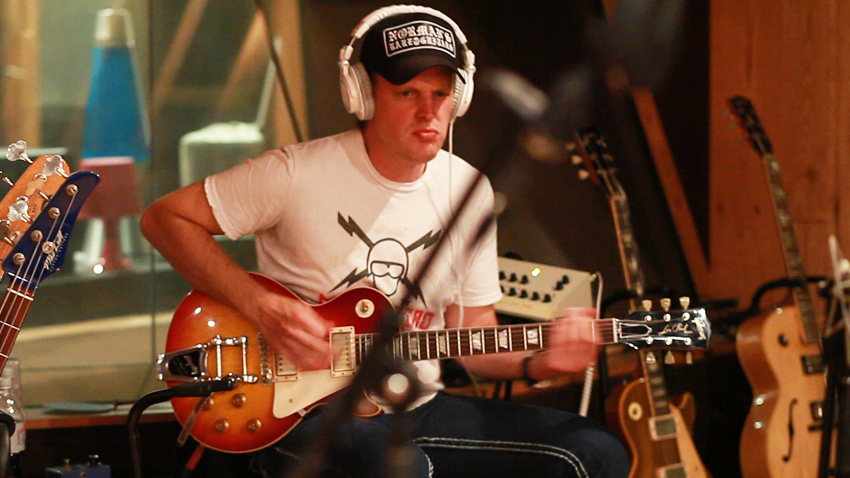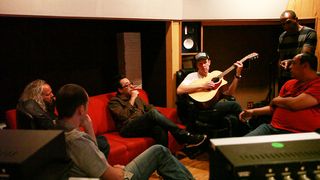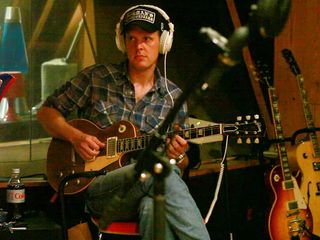
"Making this record was a great opportunity for me to do something I really enjoyed," says guitar star Joe Bonamassa, talking about We Want Groove, the upcoming debut album by the loose, funk-jazz collective known as Rock Candy Funk Party. "I've always kept this kind of music at home. I listen to it, play over it, but I never took it out into the public. In a very no-pressure way, I'm hoping to show people another side to me."
Rock Candy Funk Party is the brainchild of Bonamassa's drummer Tal Bergman and guitarist Ron DeJesus - the two issued an album in 2007 called Grooove Vol.1 - who began a series of jams at Hollywood's famed jazz hotspot, The Baked Potato. Bassist Mike Merritt and keyboardist Renato Neto soon joined in, and finally Bonamassa decided to give it a go. The quintet clicked, and after a few more appearances they took their act into the studio.
Produced by Bergman, We Want Groove features nine blissed-out, free-form originals along with a romping cover of Jimmy Smith's 1972 soul classic, Root Down (And Get It). Stylistically, the album resembles a mash-up of the best elements of Parliament-Fundadelic, Billy Preston, Herbie Hancock, the Average White Band and Weather Report, but it avoids the musical one-upsmanship that usually attends ensemble efforts by highly pedigreed players. (The group's collective credits include names such as Joe Zawinul, Hugh Masekela, Prince, LL Cool J, Bruce Springsteen and Conan O'Brien, among others.)
"We're serious musicians, but we didn't want to make a serious album," says Bergman. "We wanted to make a party record with a lot of spirit, something you can unwind with and have a good time to."
In the following Q&A with MusicRadar, Bonamassa and Bergman talk about switching musical roles, checking egos at the door and how a certain Miles Davis record became a template for We Want Groove.
Joe, you're one of those guys who sure likes to stay busy. This record, however, might really surprise your fans.
Joe Bonamassa: "And I hope it does. It's so funny, though, seeing these things online: 'Joe goes funk' or 'Bonamass's funk band.' And, you know, it's so not that. When Tal joined my band in 2010, he told me about this thing they were doing at the Baked Potato, and he asked me if I wanted to come down and play. He told me that the place held, like, 50 people, and I said, 'OK, that sounds like my speed.'
Get the MusicRadar Newsletter
Want all the hottest music and gear news, reviews, deals, features and more, direct to your inbox? Sign up here.
"We did it once, and I ended up mentioning it on the web. The next thing I knew, they were selling tickets for the next gig, which they don't usually do at the Baked Potato. But we had so much fun doing it, so we did more. We've done three or four shows now, and it's just pure joy."
Tal, what's it like being kind of the leader of the band? Usually, it's Joe who's the boss.
Tal Bergman: Well, I'm not the leader, really, although I did produce the album. It's a different animal. We're a group effort, actually - everybody contributes equally. As far as working for Joe versus working with him, it's a very similar experience. He's an easy-going guy, even though he can be incredibly particular about what he wants. When I'm drumming for him, I want to give him what he wants and do the best job I can; when I'm producing, I'm trying to get the best I can out of everybody.
"In this situation, Joe shined. He came in and he killed it. [Laughs] We've all seen Joe play brilliantly, but we were like, 'What the fuck?... That's incredible!' Within the first four bars, I knew this was going to be special. One of the most important things for me was capturing the interplay between all the musicians. Joe knows how to be part of a band, so it was pretty easy to get the right feel and mood."

RCFP drummer/producer Tal Bergman. © Martin Guigui
Bonamassa: "For me, this is great. I've had a solo project for a long time, and I did the Black Country Communion thing, which was more of a democracy, although something of an ADD-fest. I really love being in a group, and in this situation, I'm by far the most untrained, unqualified musician in the room. I like that. It makes me a better player.
"We did the whole thing in, like, 12 days. Some stuff would work, some things wouldn't. Most of the solos were done like, but there were a few overdubs. The point was just to have fun. If something was outrageous and wacky, that's exactly the kind of thing that was encouraged."
How were the songs written and tracked? Were they shells of ideas that you guys jammed on?
Bergman: "We all came in with ideas for different grooves. But in reality, we left a lot of stuff behind once we started playing. I found out that the best ideas happened right in the moment. A lot of the time, somebody might have the germ of an idea, but it would go somewhere else pretty quickly."
When you guys are on the road, what kinds of funk albums are on your playlists? Anything backstage or on the bus that found yourselves both listening to?
Bergman: "It's funny, because Joe is like a sponge. He keeps a very open mind, and he doesn't like to be in a box. All of us are all-around players. When we talked about this on the bus before going into the studio, we'd play some Sly Stone and then a little Miles; then we'd go into Herbie Hancock and Billy Cobham, and then it'd be Earth, Wind & Fire and James Brown. Joe loves all of that stuff."

A bunch of funky guys just sittin' around talking. (from left) Bergman, engineer Yossi Shakked, Renato Neto, Bonamassa, Mike Merritt and Ron DeJesus. © Martin Guigui
Bonamassa: "The cool thing is, now the buses have internet, and so if you're not in Nebraska, in the middle of nowhere, you can actually stream a low-level YouTube clip. We end up sitting on the bus and having cool games of one-upsmanship - who can come up with the cool stuff to listen to. It certainly beats watching the Kardashians on Direct TV.
"One night, Tal and I were up late, and I know this sounds very Spinal Tap, but we drew it out on a napkin. I said, 'What would happen if we did a record? Not a covers record, but an original record that was really dry, with no effects?' I asked Tal how he would produce it, and he said, 'Well, I'd get Renato Nato, and I'd get Mike and Ron, and we'd sit in a room and write it and record it in the same day.'
"I liked that. Tal made the calls, and off we went. Ron and Tal had the band already, so I was just like the invited guest. And it was cool - everybody was equal, everybody got to do their thing."
Joe, I guess this is a good thing, because I can't tell the difference between your guitar playing and Ron's.
Bonamassa: "I'm generally panned to the left, and my tone is darker, like an early Larry Carlton. Ronnie's tone, especially on the rhythm side, is more like a Fender, a little brighter - and certainly funkier. He's a master of that James Brown guitar stuff. All the ring modulator parts, that's me. I was having fun with a new toy."
How was it for you to step outside your box a little bit, Joe? You are known for the blues, and BCC was blues-rock, but playing funk is different.
Bonamassa: "Yeah, it is. Plus I was playing over adult chords - you know, where you actually have to know the next change. [Laughs] The way you hear it is the way it went down, but it's not about laying back at all. You have to stay on your toes."

Bonamassa deliberately chose small amps to change his sound for RCFP. © Martin Guigui
Did you play through different amps than you normally would for your own music?
Bonamassa: "I did, actually. I used two very small amps predominantly: a 1961 Gibson Ranger, which is a single 10, and a 1955 Fender Tweed Deluxe, which is a single 12. On my guitar, I used the front pickup only, and I generally went straight into the amp - apples to oranges from what I normally do. I wanted it to be different. My normal sound wouldn't fit the record."
The album We Want Miles was something of a benchmark for the band. You constructed We Want Groove as a bit of an homage to it, right?
Bonamassa: "That record was the one we all agreed upon. The sonic quality and the approach of the Marcus Miller-era - we were paying tribute, for sure."
Bergman: "That album was a bit of a jumping point because it was so raw. Miles had Al Foster in the band - he's a bebop-jazz drummer, but there he was playing grooves. Then he had Marcus Miller on bass, and he's amazing. The combination really worked, because Miles was minimalist, so he got those guys to play just the right notes at the right time. The record takes you on a journey. That's something we were aiming for, and so We Want Miles was what we looked to for inspiration."
Tal, what kind of approach do you have when playing Mike? Obviously, the importance of the rhythm section in funk can't be overstated.
Bergman: "I'll tell you, Mike makes it so easy for me. I could go outside and come back, and the groove is still there. I could go home or take a walk around the block, and when I sit back down, we're still together. His fills are so solid. What I really like is that he's not too technical or polite like some very advanced players. He's got dirt to his groove."
Bonamassa: "I'm just glad that I was able to fit in. You know, I wouldn't have made the cut for James Brown's band, but I do like that sound. I'm just a throwback guy. It's the same thing with Black Country Communion - new songs done in an old way. I have these influences, and I have the gear, so it's an opportunity for me to be anonymous and play music with friends.
"You know what our tour is? The Baked Potato. There's no Glenn Hughes going, 'Give up your solo career and take BCC on the road.' None of that. We play the Baked Potato, and that's it - that's the gig."
Joe is a freelance journalist who has, over the past few decades, interviewed hundreds of guitarists for Guitar World, Guitar Player, MusicRadar and Classic Rock. He is also a former editor of Guitar World, contributing writer for Guitar Aficionado and VP of A&R for Island Records. He’s an enthusiastic guitarist, but he’s nowhere near the likes of the people he interviews. Surprisingly, his skills are more suited to the drums. If you need a drummer for your Beatles tribute band, look him up.

"Anybody who thinks they can do exactly the same thing they did 50 years ago is mad": Deep Purple's Ian Paice and others on the demands of playing drums in your 60s and 70s

"It was a fair fight that I got thrown out of the band for, because Moon came for me with a tambourine": When Roger Daltrey was fired from The Who at the worst possible time in 1965
Most Popular








